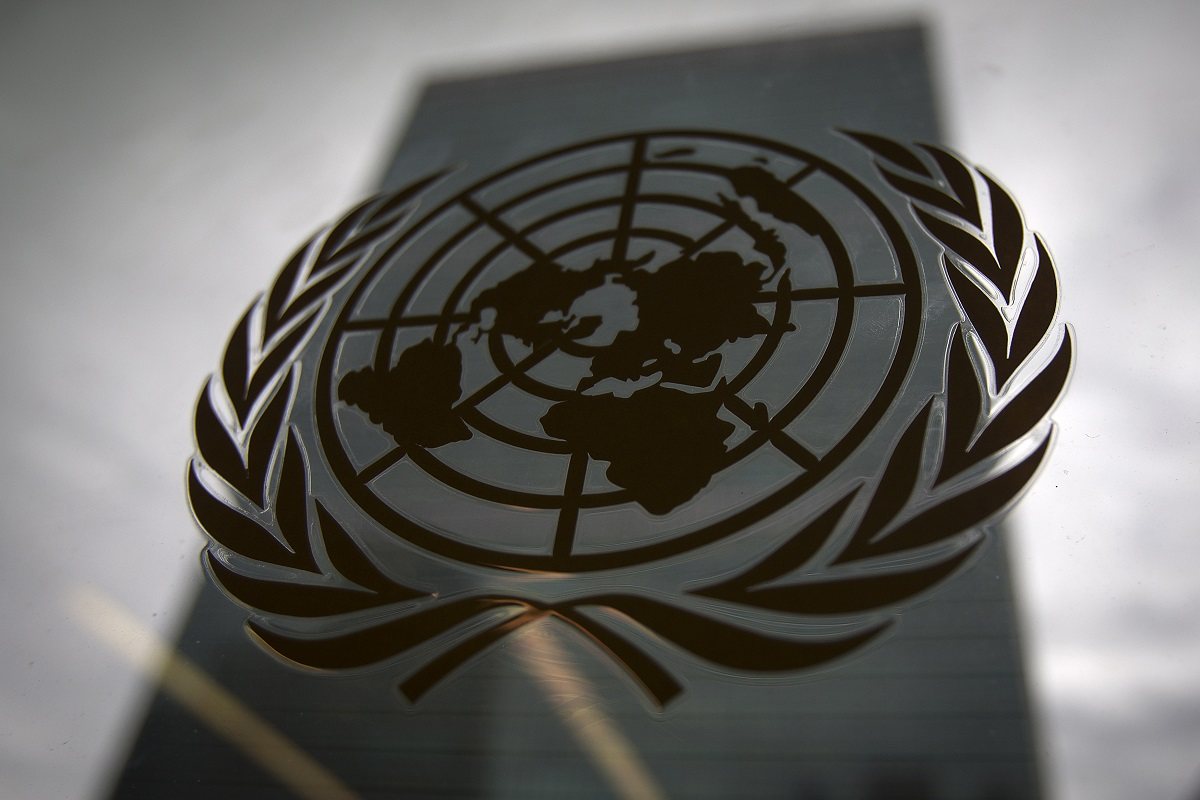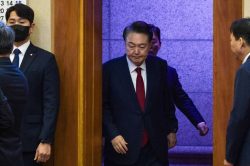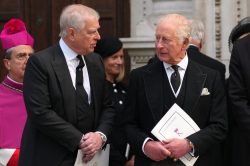
The United Nations headquarters building is pictured though a window with the UN logo in the foreground in the Manhattan borough of New York August 15, 2014.
12:36 JST, April 18, 2023
The United States eavesdropped on United Nations Secretary General António Guterres’s conversations with other U.N. officials, according to four classified reports obtained by The Washington Post.
The documents, two of which haven’t been previously reported, summarize intercepted conversations that shed new light on Guterres’s interactions with top U.N. officials and world leaders, including detailing what they describe as his “outrage” over being denied a visit to a war-torn region in Ethiopia and frustrations toward Ukrainian President Volodymyr Zelensky.
The documents are part of trove of national security reports, allegedly leaked onto the online messaging platform Discord by a member of the Massachusetts Air National Guard, that have revealed secrets about everything from gaps in Ukrainian air defenses to the specifics of how the United States spies on its allies and partners.
The reports on Guterres appear to contain the secretary general’s personal conversations with aides regarding diplomatic encounters. They indicate that the United States relied on spying powers granted under the Foreign Intelligence Surveillance Act (FISA) to gather the intercepts. Parts of that spy law face a difficult reauthorization fight before they are due to expire this year.
The Guterres documents, which appear to mix direct quotes from the secretary general and his aides with analysis from intelligence officials about his emotions, underscore some of the secretary general’s most tense recent diplomatic efforts.
According to a summary report dated Feb. 17, Guterres wanted to confront Ethiopian U.N. representative Taye Atske Selassie Amde after the country’s foreign minister, Demeke Mekonnen, apparently sent Guterres a letter rejecting his plans to visit the country’s embattled Tigray region to support the peace process there. Ethiopia and the Tigray People’s Liberation Front signed a peace treaty in November after a two-year conflict, although tensions remain.
“Guterres wanted Taye to convey his outrage to Demeke, exclaiming that this was the first time he received such a letter from any government during his tenure as UNSG but he guaranteed that it would be the last and that Demeke ‘would not have an opportunity to write another letter like that one,'” the document reads.
At an African Union summit in the Ethiopian capital, Ethiopian Prime Minister Abiy Ahmed “apologized to him for denying Guterres’ planned visit to the Tigray region,” Guterres told a U.N. official on Feb. 19, according to an undated document from the trove.
After the African summit, Guterres traveled back to New York and then to Switzerland, Iraq and Qatar in early March. Another document portrays him as “not happy about” about the possibility of traveling to Kyiv just days later, when the Ukraine government said Zelensky wanted to meet with him personally. The report does not identify the reason for the secretary general’s unhappiness, but a longtime U.N. diplomat noted that Guterres, 73, travels commercially and had been on the road for weeks, and the trip to Ukraine required another long flight, followed by an 11 hour drive to the capital. “It’s not as if he’s on his own private plane where he can sleep,” said the diplomat, who spoke on the condition of anonymity to discuss internal conversations.
Another document reported that following Guterres’ March 8 private meeting with Zelensky and a joint news conference, the secretary general reported to his spokesman, Stephane Dujarric, that he was “really pissed off” about a surprise public ceremony in honor of International Women’s Day during the visit.
Aides later said Zelensky had sprung the event – which included the presentation of medals to uniformed soldiers – on Guterres without warning and later posted photographs and videos of the event that implied the secretary general was congratulating military personnel on one side of the Russia-Ukraine war. Guterres has repeatedly condemned Russia’s invasion of Ukraine as a violation of the U.N. Charter and international law. “The sovereignty, unity and territorial integrity of Ukraine must be upheld within its internationally recognized borders,” he said at his news conference with Zelensky in Kyiv. The document says only that Guterres “emphasized that he made a point of not smiling the entire time.”
Guterres told Dujarric that he went to Ukraine to help, but the Ukrainians “do everything to liquidate us,” according to the apparently intercepted conversation in the report.
Dujarric said Friday in an interview with The Post that Guterres “was indeed unpleasantly surprised that a medal ceremony was added, without prior consultation, at the end of his very productive meeting in Kyiv with Ukrainian leaders. However, he denies categorically using the term ‘liquidate.'”
Despite Guterres’ condemnation of the Russian invasion, another document, which was previously reported by the BBC, indicates that the United States believed Guterres was undercutting international campaigns to hold Russia accountable for the war.
Remarking on the apparent interceptions, Dujarric told reporters last week that Guterres has “been in politics and a public figure for quite some time; so he’s not surprised, I think, by the fact that people are spying on him and listening [in] on his private conversations. . . . Unfortunately [leaking] it allows such private conversations to be distorted and made public.”
The U.S. government has not responded to the substance of the leaks. A State Department spokesperson said: “This is not something we can confirm and, as a matter of principle, intelligence matters like collection methods are not something we would ever discuss.”
The National Security Agency referred questions to the Justice Department. The Justice Department declined to comment. The Defense Department did not answer a request for comment.
The Ethiopian and Ukrainian foreign ministries did not respond to a request for comment.
At least some of Guterres’s conversations, the documents indicate, were collected under the FISA law, which is under increasing scrutiny from lawmakers. In recent months, Republicans have joined arms with civil liberties advocates in pushing to either let some FISA spying powers expire or significantly revamp how those powers work.
Civil liberties advocates say Section 702 of the law, which authorizes warrantless spying on foreign targets, violates the privacy of Americans because it can potentially allow for the collection of U.S. citizen communications with those foreign targets. Republicans, meanwhile, have grown skeptical of FISA for its role in eavesdropping on ex-Trump campaign aide Carter Page. The Justice Department’s watchdog has found that the wiretap application for Page, which was obtained under a different provision of FISA known as Title I, and other surveillance targets were faulty.
U.S. intelligence officials argue that Section 702 is one of the government’s most powerful and important national security tools.
Surveillance law experts said the government can obtain authorization under FISA for different types of collection depending on the technique used and the nationality and location of the target. Foreign targets who are located outside the United States can typically be spied upon warrantlessly under Section 702, they said. Inside the United States, spying on foreigners or Americans suspected of being foreign agents would be done under Title I, which generally requires obtaining a FISA court order.
“In a very unfortunate and unintended way, this will actually have the effect of highlighting the value of intelligence collected under FISA,” said Glenn Gerstell, a former general counsel at the NSA who is now a senior adviser at the Center for Strategic and International Studies think tank.
The new revelations about surveillance at the United Nations fit into a long history of snooping on the world body.
Amid revelations that the NSA had eavesdropped on allied leaders – including German Chancellor Angela Merkel and U.N. diplomats – U.S. President Barack Obama in 2013 ordered the agency to stop the practice. At the time, a senior Obama administration official told Reuters that “the United States is not conducting electronic surveillance targeting the United Nations headquarters in New York.”
Years earlier, in 2005, the United Kingdom reportedly bugged the office of U.N. Secretary General Kofi Annan.
And U.S. intelligence infiltrated United Nations arms control teams in Iraq to spy on that nation’s military for three years, using both intelligence agencies and espionage equipment for the snooping, The Post reported in 1999.
United Nations officials vocally protested some of those previous incidents at the time, saying the U.S. government and allies had violated international agreements.
“I don’t think anyone here in this organization believes that any of our communications are 100 percent secure” from the United States or other members, the diplomat said. “The fact that those member states that have the ability to spy or listen in on private conversations at the U.N. do so is not surprising, but it’s frankly deeply annoying,” the diplomat said.
Top Articles in News Services
-

Survey Shows False Election Info Perceived as True
-

Prudential Life Expected to Face Inspection over Fraud
-

Hong Kong Ex-Publisher Jimmy Lai’s Sentence Raises International Outcry as China Defends It
-

Japan’s Nikkei Stock Average Touches 58,000 as Yen, Jgbs Rally on Election Fallout (UPDATE 1)
-

Trump Names Former Federal Reserve Governor Warsh as the Next Fed Chair, Replacing Powell
JN ACCESS RANKING
-

Japan PM Takaichi’s Cabinet Resigns en Masse
-

Japan Institute to Use Domestic Commercial Optical Lattice Clock to Set Japan Standard Time
-

Israeli Ambassador to Japan Speaks about Japan’s Role in the Reconstruction of Gaza
-

Man Infected with Measles Reportedly Dined at Restaurant in Tokyo Station
-

Man Infected with Measles May Have Come in Contact with Many People in Tokyo, Went to Store, Restaurant Around When Symptoms Emerged
























